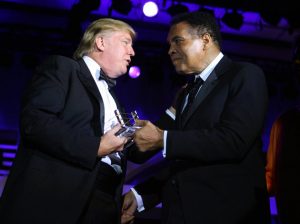(Akiit.com) The choice of former President Bill Clinton to give one of the eulogies of Muhammad Ali at his funeral Friday has rankled more than a few. Clinton has been lambasted by many blacks for his push of the omnibus crime bill, the wild expansion of the death penalty at the fed level, his gut of welfare, and the demolish of banking regulations and other initiatives that allegedly resulted in the locking up of and impoverishing of millions of blacks. However, just suppose it wasn’t Clinton, but Trump who had been asked to give one of the eulogies?
The firestorm would have been cataclysmic. The very idea is not sacrilegious. Ali and Trump had a long, cordial, and even intimate relationship though they seemed as far apart as the sun and the moon. In the 1960s, Ali was the outcast black separatist, anti-government activist, near imprisoned draft refusnik. He was unceremoniously dumped from boxing, dogged every step of the way by a small phalanx of FBI agents, and had a telephone book thick government intelligence dossier. He was America’s number  one pariah.
one pariah.
At the same time, Trump lived a silver spoon life. He was a young well-to-do white guy, with no declared political interests, or activism, who busily worked for his father in his real estate development company, and attended the Wharton School at the University of Pennsylvania. When he graduated it was a given that he was a young privileged white guy whose sites were clearly set on making gobs of money in the real estate and casino and hotel development business. He was the epitome of the American Dream. Though there’s no record of Trump saying anything about Ali’s draft refusal, defiance of the government, and radical black separatist anti-white pronouncements then, it doesn’t take much imagination to think that Trump saw Ali just as many others did. That was as an unpatriotic, white hating, black militant. The same year the Supreme Court tossed Ali’s conviction on draft evasion in 1971, Trump officially took over the Trump Organization and would spend the next three decades wheeling and dealing in the real estate and business world buying and plopping down casinos, hotels and golf courses throughout the country.
Meantime, Muhammad Ali, often cash strapped, and with plenty of debt from the nearly four years he was banned from the ring, had to scramble to make money with big marquee fights against the Frazier’s, Norton’s, and Foreman’s. Though legions hailed Ali for his pugilistic skills, and he had many admirers, legions also were not ready to forgive him. To them, he was still a back racist, loud mouth, draft dodger.
But Trump wasn’t among those legions. Trump’s cheer lead of Ali started when he was enthralled with him after watching the first Ali-Frazier fight in 1971. To Trump, Ali not just a classy and courageous boxer, but a cash cow. And for someone like Trump who saw boxing as a way to fill up lots of seats at his casinos, Ali was a natural attraction. For a businessman, this was too much to resist. Trump was now firmly on the Ali bandwagon.
In the next decade, Trump threw a birthday party for Ali, gave testimonials at events for him, and shelled out tens of thousands in donations to Ali’s Arizona based Muhammad Ali Parkinson Center. Ali reciprocated by giving Trump a couple of humanitarian awards. This was not just the standard run of the mill stuff that businessmen do to burnish their image as charitable good guys and to get a bushel of tax write-offs in the process.
Trump admired Ali as a courageous fighter and solid role model of someone who was reviled but bounced back. Ali in turn seemed to admire Trump for his willingness to reach out and support causes that were near and dear to him, and to actually show that he really cared about him. Muhammad Ali was careful to give Trump a big pass when he lashed out at his silly, crude, and offensive call to consider banning Muslims from the country. Ali did not mention Trump by name in his criticism, he simply convinced himself that Trump was really referring to “jihadists and extremists,” not all Muslims.
The mutual admiration society that Donald Trump and Ali had for each other was real and heartfelt. Donald Trump was quick in the door in his praise of Ali when news broke of his passing. This was not simply playing to the public and media gate. It was genuine. The takeaway is not that Donald Trump, the noxious, race and Muslim baiting demagogue, and Ali, the socially conscious, much beloved Muslim, could find common ground. It is simply another indication that Ali could bridge the unseemingly unbridgeable gulf between someone who would use shamefully race and religion as a wedge to polarize and divide. This is a tribute to Muhammad Ali’s greatness, and it’s also testament to Trump’s acknowledgement of that. Yes, he, not Clinton, could have been one of those to eulogize Ali.
Columnist; Earl Ofari Hutchinson
Official website; http://twitter.com/earlhutchins









Leave a Reply